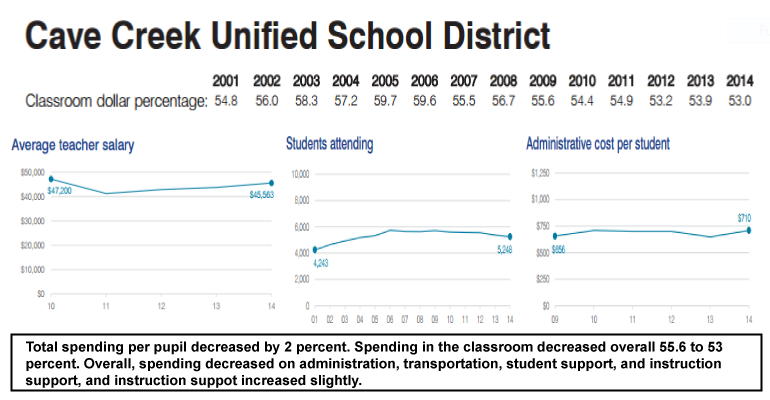
Arizona’s Democrat lawmakers had proposed less money for schools, but on Thursday night, they joined Republican lawmakers in passing a plan proposed By Governor Doug Ducey to settle the Cave Creek v. DeWit lawsuit for $2.2 billion in additional funds into Arizona’s K-12 schools over 5 years.
Earlier in the day, during a hearing by the House Appropriations Committee, House Rep. Lela Alston stated, “It feels odd to be the conservative here.”
The roles had indeed reversed and according to sources, one of the biggest fears for Democrats was losing control of the lack of school funding narrative as they head into the upcoming 2016 election. Rep. Otondo implied that the Republicans were passing the increase in funding in order somehow affect the many override and bond measures coming before voters next Tuesday.
However, the plaintiffs were eager to settle. Initiated by the wealthy Cave Creek Unified School District, which has increased administrative costs while decreasing teacher pay, the potential for a court win was unlikely. The settlement was far more desirable than the smaller amount in funding the Democrats sought in order to a vote by the people.

Earlier this week, State Senator Steve Farley admitted that the “plaintiffs don’t want to continue to press the suit through additional appeals because they believe it will take too long and the outcome may be uncertain,” in a Facebook post. For Farley, the sticking point is the need for the voters to approve tonight’s action in a May 2017 election.
The Republican’s plan requires voter approval for increasing the amount of money used from the State Land Trust, the Democrat’s plan would have given schools less money, but the voters would not have the right to vote on the matter as the money would come from the State’s current surplus and Rainy Day Fund.
“I am glad that we were able to do this without sweeping funds from First Things First. Now we just need to make sure that this extra money for school funding does not end up in the pockets of the administrators. I want to see funding make it to the classroom, and that while in the classroom it goes to academics,” stated Rep. Kelly Townsend.
Rep. Bob Thorpe appeared on the James T. Harris show before the vote and explained that both the Governor and the House are trying to “turn this lawsuit into something good for schools, for students.” Thorpe noted that the plan increases funding by over $3 billion without raising taxes. “It going to look like we will be able to provide for stability for schools district, especially those that have been struggling like the rural districts,” said Thorpe who represents a mostly rural region of the state. “Certainly our intention – of the GOP – the Republican Caucus – is to try to turn this around as a win for the entire state.” Listen to the interview here
House members say that Majority Leader Steve Montenegro spoke for them tonight when he delivered his comets on the floor.
Montenegro said that he supported HCR2001, because “we’ve been looking for ways to increase the resources for classrooms in Arizona without raising taxes. At the same time, for years that important policy discussion has been mired in a legal dispute over the precise amount of inflation that should be paid each year in the state budget. The agreement we vote on today puts significantly more resources to K-12 education—$ 3.5 billion dollars over 10 years—without raising taxes.”
“The legal questions remaining in the lawsuit could have taken months, or even years to resolve. Instead of fighting it out in the Courts, both sides in the lawsuit are agreeing to a specific “base level” (that is amount for inflation funding). This means the dollars can start flowing to classrooms. At the same time, this measure protects our State’s financial standing, by giving flexibility to lawmakers and the governor in the event that our economy is subjected to a serious recession—like the one that crippled the State in 2008 and 2009. During serious economic downturns Arizona can take a pause in providing inflation payments, and then resume when the economy rebounds. That is flexibility that would have made all the difference in 2009,” stated Montengro. “In fact, the lawsuit would have never occurred. I’m confident that voters want to fund education. But they also want to be financially responsible. This deal meets both those objectives.”
“In the HCR 2001, the voters are being asked to increase the distribution to K-12 education from state trust land investment proceeds. These dollars will be part of funding the inflation requirement, stated Montenegro.”
“Now I care about funding schools,” continued Montenegro. “But I also care about results. No enterprise should ever be funded without regard to whether it is achieving success. This is especially true for a government enterprise. That’s why I am especially pleased that this measure not only provides more resources, and is fiscally responsible—it also preserves the constitutional authority of lawmakers—the elected representatives of the people.”
Montenegro said it was a “good week for the state of Arizona.” He called the agreement historic” that “puts the resources where they belong, in the classroom.”
Related articles:
Arizona Schools Declare Impasse in Cave Creek v. DeWit
Arizona Leaders React To Education Funding Plans
As Legislature Convenes, Transparency Not Money Should Be Focus
